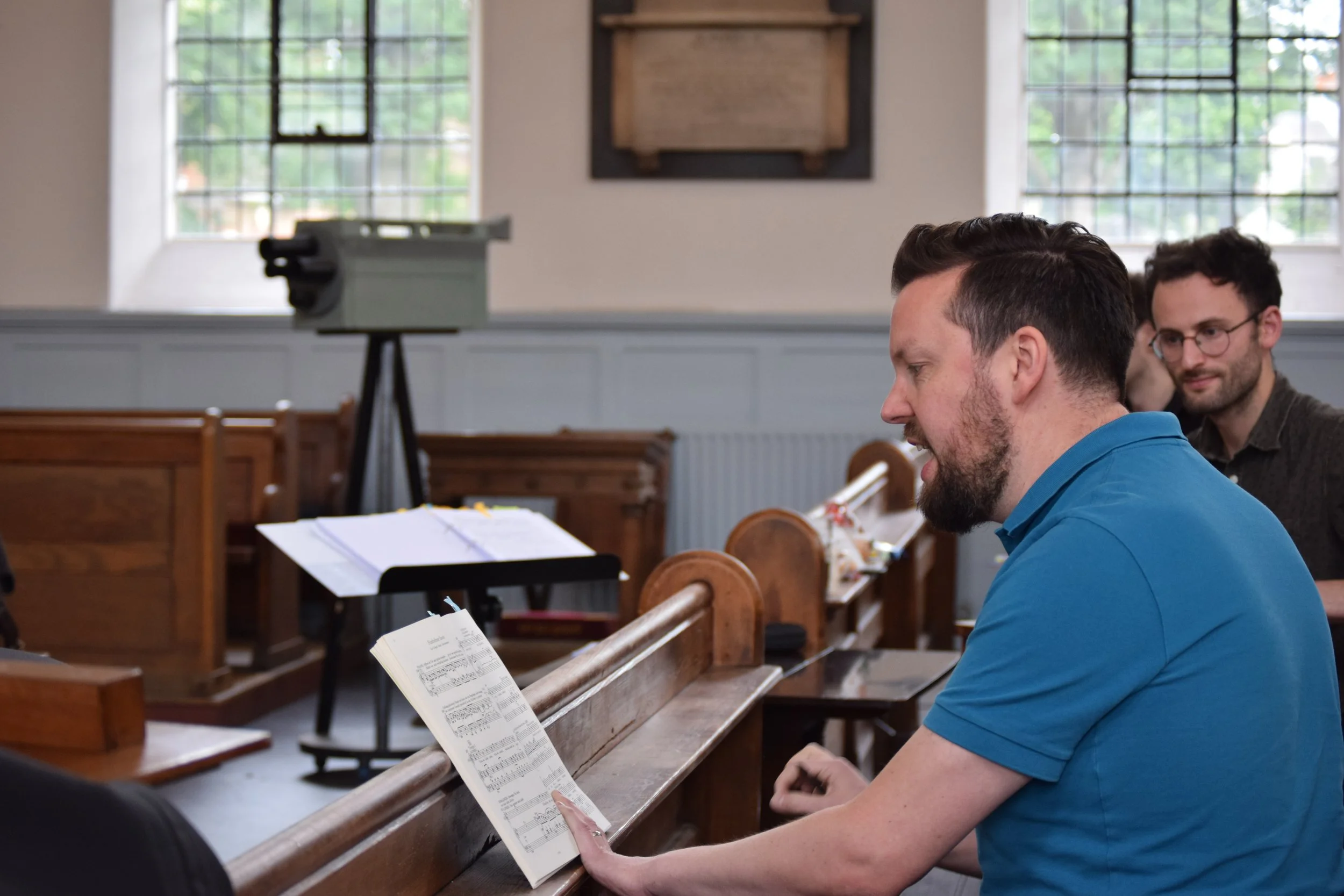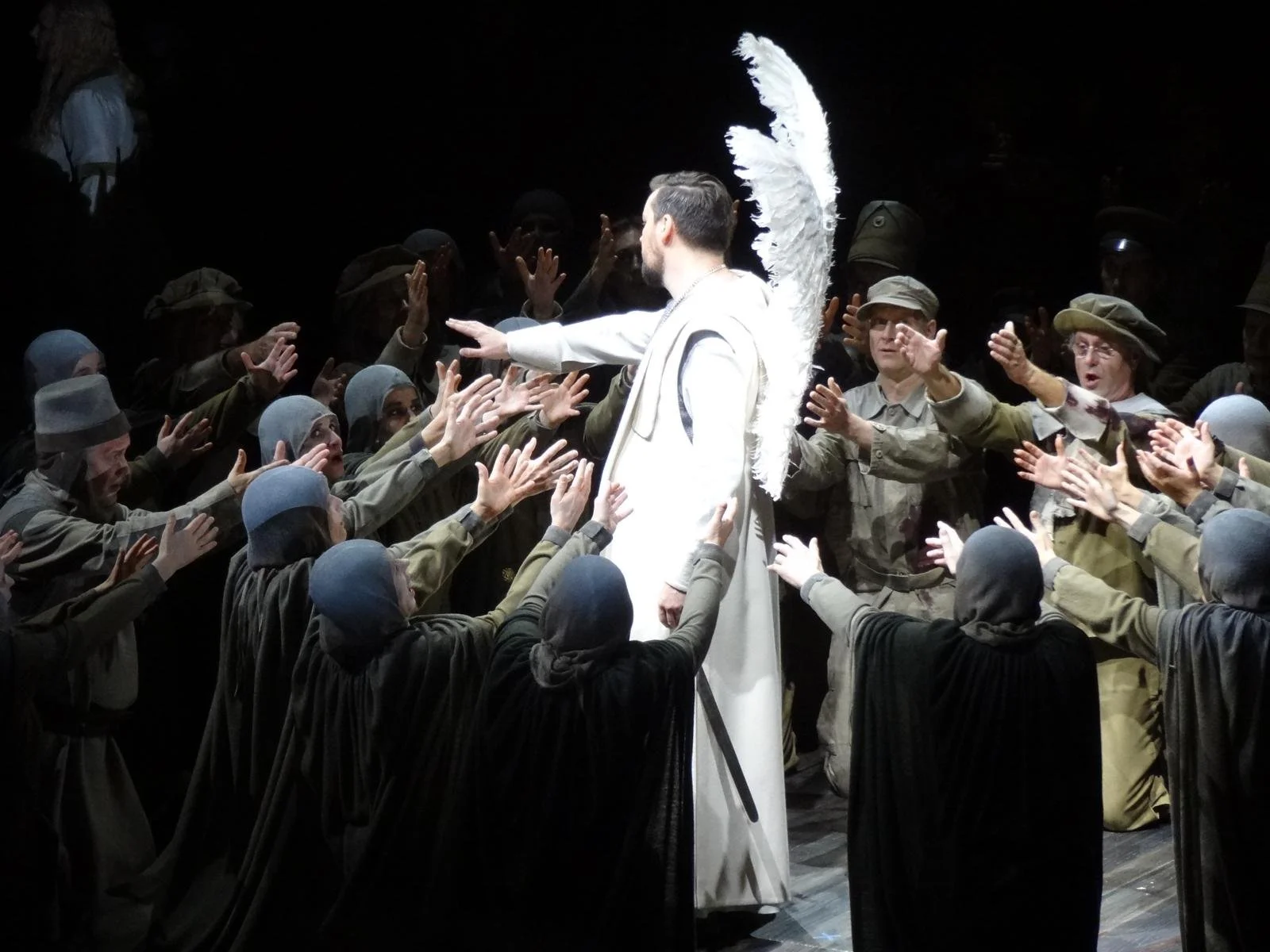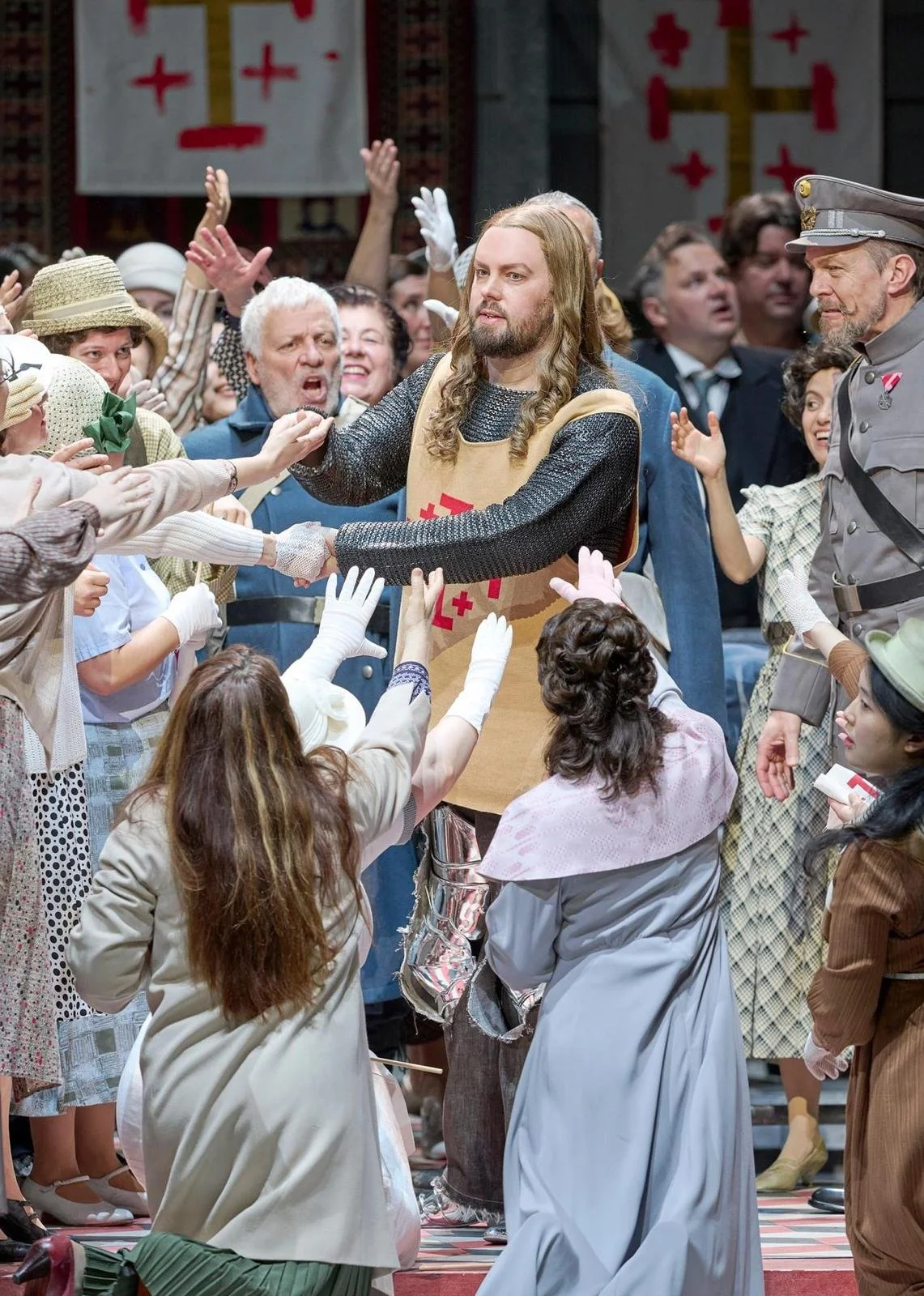international tenor AND SPO PATRON David Butt Philip talks to Ruth Eastman
As rehearsals for Die Fledermaus gathered pace in May, SPO Founder Tricia Ninian asked me if I would like to interview David Butt Philip, St Paul’s Opera’s esteemed patron, with a view to the conversation appearing in the programme and the Clapham Society’s July/August Newsletter which I edit. It was a perfect fit and David was a willing participant, speaking to me on Zoom from his apartment in Vienna where he was performing at the Staatsoper in Die Meistersinger. Tricia and I both had questions we wanted to know about. It was so generous of David to speak to us. The conversation took place two days after the general election had been called.
How do you see your role as patron of SPO?
David in full voice at the 2024 DBP and Friends gala
It was something that happened quite organically. The relationship started when I was invited to start giving master classes, which went well and were fun and people seemed to get a lot out of them, so we started experimenting with fundraising concerts and they also went well. Other than that I haven’t really been involved in a hands-on way although I am this year going to come and sit in on some rehearsals for Die Fledermaus, which I haven’t done in the past so that’s quite nice. The last couple of years I’ve been mostly out of the country during the period of their summer productions so I’m looking forward to these rehearsals.
Tricia told me you were going to be doing that and she’s very excited that the singers will be able to benefit from your international experience. When you attend the rehearsals do you know what you will be looking for?
No, not really. I need to discuss with the director and the music director in what capacity they would like me to be there. I mean, I’m happy to sit and observe, if that’s what they prefer or, alternatively, to be more involved in terms of giving feedback, particularly on the musical side obviously, but we need to talk about that. I don’t know the stage director but the music director, George Ireland, is a friend of mine. I met him through St Paul’s actually. He accompanied the masterclass in 2023, then I invited him to be one of the pianists for the fundraising gala this year. We’ve also worked together outside of that. He’s a really good guy.
Going back a bit, how did your singing career start?
Being a singer started when I joined the church choir at the age of seven. That’s when I fell in love with singing and started to think of myself as a singer. But my career, I had a roundabout way into training as a professional. I didn’t do music A-level, and although I did lots of music in my spare time when I was a teenager it was mostly popular music and music theatre. I grew up in Wells in Somerset. No, I didn’t sing at the cathedral. My sister was a chorister there. I was a chorister at Peterborough for complicated reasons to do with age.
So, I was always involved with music – it was my hobby. Then I went to university (to study philosophy and politics) and my hobby began to take over. I dropped out of Liverpool after my first year and decided to make my hobby my principal focus. Having left, I auditioned for the Royal Northern College of Music and got in. That wasn’t something I had ever considered doing and when I got there at the age of 22 I realised very quickly that this was something that I was supposed to be doing. After getting my bachelor’s degree at the Royal Northern I did post-graduate later at the Royal Academy of Music in London.
And then you were a Jette Parker singer…
Yes, that was fabulous. The artistic director, David Gowland, who is still there, was very encouraging. He put a lot of faith in me as did the rest of the music staff at the Royal Opera House. It was a fantastic opportunity. I was 32 and had been in the Glyndebourne Chorus for two years, but I had almost no experience as a soloist at that level – with the best singers, the best conductors, the best directors in the world – and from that perspective it was incredibly useful. When you’re put in that situation you strive to raise your game to that of the other people in the room and that benefits you.
You touched on this in one of your SPO masterclasses but how did you make the switch from baritone to tenor?
David giving the benefit of his experience at a Die Fledermaus rehearsal
It’s almost hard to remember, because it was 14 years ago. It happened quite naturally. In the two years after I finished at the Royal Academy, particularly when I was working at Glyndebourne, my voice was changing physically. It was getting higher, and the resonance was feeling like it was in a different place. I experimented with singing tenor repertoire for fun and then spent about six months going around the country and seeing different coaches and teachers that I knew and respected – at Glyndebourne, the Royal Academy, the Royal Northern – to get feedback.
They all said, ‘We think this is a good idea’. So I made the switch, largely with the support of Glyndebourne who agreed to have me back in the chorus the following year as a tenor. That removed the risk in terms of losing work, which was the main risk. And that is how it began. That was 13 years ago, my summer in Glyndebourne as a tenor; my first job as a tenor.
What were you singing that summer – can you remember?
Funnily enough, I can. Serendipitously it was the opera that I am doing now in Vienna, Die Meistersinger von Nürnburg, which I encountered for the first time that summer and completely fell in love with. I said to myself during those performances that I needed to sing the lead role in this one day. It’s wonderful and here I am.
The role you’re singing now is a heldentenor. What is the difference between a heldentenor and a ‘tenor’ tenor.
Well, there’s no such thing as a tenor tenor. A heldentenor is a sub-category of tenor. Helden just means heroic and Heldentenor is the German word for a tenor who sings the heroic tenor roles in the operas of Wagner and Richard Strauss. Within that there is a whole range of different possible voices. For example, there is the kind of heldentenor that sings roles such as Tristan and Siegfried, which I don’t do, but I do sing Walther von Stolzing, Lohengrin and Bacchus in Ariadne auf Naxos, which are categorised as heldentenor roles.
DBP – Prince in Rusalka at the Royal Opera House
I suppose you would say that the other side of that is a lyric tenor, the kind of tenor who sings Rodolfo in La bohème or Alfredo in La traviata. If I’m one or the other, I’m a heldentenor, but I don’t really consider myself as one or the other! I would consider myself a mixture of lyric and heroic and that’s why I like singing Meistersinger and Lohengrin which are on the lyrical side of the heroic repertoire.
Does the heroic repertoire call for a different technique?
It’s not a different technique but it does call for different strengths. Obviously’ there are grey areas, but the German heroic repertoire requires the ability to sit in a high register all the time. It also requires the ability to be heard over an extremely large orchestra to which extent it requires a certain amount of volume. Those are the main strengths that a traditional heldentenor needs. They also need stamina because some of these roles are four and a half hours of music. They’re marathon-running events rather than sprint events.
Is there a role you would still like to sing, and is there one you would like to avoid?
I’m extremely lucky in that if you’d asked me five years ago what roles I’d wanted to sing I’ve done almost all of them now, which is wonderful. Die Meistersinger would have been very high on my list, also Ariadne auf Naxos, Rusalka, Jenůfa; these are dream roles for me and ones that I now do fairly regularly.
There are of course other things that I would like to do. My main work is in German and Czech repertoire and I would like to do more Italian repertoire. I would love to sing Tosca one day or La fanciulla del West or Andrea Chénier. I’m looking forward very much to doing Pagliacci at Opera Holland Park this summer. That is something I haven’t done before and it’s an opera that I’ve always absolutely loved.
In terms of ones that I don’t want to do, I wouldn’t rule anything out at this stage. There are several Mozart roles that I wouldn’t want to sing but they’re not ones that I will ever be asked to sing, so it’s fine.
Do you speak lots of different languages? I remember you talking about correct pronuncation in your masterclass. Or do you just have a facility?
Lohengrin at Deutsche Oper Berlin
Yes, I just have a facility really. I don’t speak any other languages fluently. I can get by in rehearsals in German and in French, and I have basic rehearsal room Italian but not quite at the same level as German or French. If I had the time I would get my German fluent but I don’t really have the time! It’s getting better…
Do you have special learning techniques?
Nothing special really, just repetition. Long boring evenings pacing around my apartment with sheets of paper or an iPad with the text on it and testing myself over and over and over again. It’s the most boring and the most lonely part of the job, and I absolutely loathe it!
Do you have any strategies to keep your voice – and your health on top form?
Well, it’s basic things, really, like getting the correct amount of rest in between performances and a regime of simple vocal exercises that I’ve maintained since I was at college that I do pretty much every day. I do the same as most people do just to keep in shape: try to get enough sleep, drink a lot of water.
Have you ever sung Die Fledermaus before?
No, never. Oh well, that’s not quite true. When I was at the Royal Academy we did a scene from it with me as Eisenstein, but only one scene and that was 16 years ago now.
And now some questions from Tricia
We know that your connection to Clapham and St Paul’s Opera came through your friends Mary Lucille Hindmarch and Jeremy Clayton. Are there any other local connections?
No, that was how it started. Mary Lucille introduced me to Tricia and suggested the idea of me coming to do a masterclass. That was in 2017. Mary Lucille is one of my mother’s closest friends. She and Jeremy came to watch Lohengrin here two weeks ago, which was nice.
Since working with St Paul’s Opera in 2017 how have you seen it grow?
The productions have got more ambitious and have involved more people. Also the audiences – for the masterclasses and for the fundraising concerts – have got better and more enthusiastic, which is lovely to see. Several of the singers and pianists that we’ve worked with over the years have gone on and started to have careers of their own. That’s fantastic as well.
In the light of the current economic climate what role do small arts organisations such as St Paul’s Opera play?
They play a vital role because performance opportunities and, more to the point, employment opportunities for singers at the start of their career are increasingly hard to find, even more than they were when I was first out of conservatoire 15 years ago. Small groups that put on semi-professional or amateur works that showcase the talents of those people are incredibly important because otherwise those singers aren’t going to get early-career performance opportunities.
How can the artistic culture be rekindled, and what role can St Paul’s Opera play in this in the future?
We need a significant discussion about how we fund culture in this country. Whether that’s going to happen or not in the near future I certainly wouldn’t put my house on it, although I’m slightly more optimistic about what the next government will deliver. Even so, I wouldn’t imagine the arts is going to be high up on any party’s priority list and that is the problem. We just have to keep the passion and the enthusiasm alive. At the grass-roots level if we keep creating work and opportunities we’ll continue to produce art that feeds into the eco-system of culture and arts nationally, which will produce more high-quality work at the top level.
Can you paint a picture of the world outside the UK based on your experience and connections?
Lohengrin at Wiener Staats Oper
I’m lucky that I work a lot in Germany and Austria, countries that heavily subsidise opera to a level that is completely incomparable to the UK. Vienna, a city of 2 million people, has more full-time opera companies than the whole of the UK. There are three full-time opera companies in Vienna, and in the whole of the UK we have six that are technically full time: Royal Opera House, English National Opera, Welsh National Opera, Opera North, Scottish Opera and Glyndebourne. Only three of those (ROH, WNO & Opera North) employ full-time professional chorus and orchestra since the English National Opera cutbacks. And WNO is now threatened with a similar fate. It’s only the ROH which maintains a performance schedule as busy as a full-time German or Austrian house. The rest are essentially seasonal. So, it’s pretty slim pickings in the UK. Germany has, I think, 80 subsidised opera houses.
St Paul’s has been focusing on the careers of emerging artists. Witness the bursary support from Friends of St Paul’s Opera for Die Fledermaus. What was your journey as a young artist?
I was lucky to be supported by organisations like the Musicians’ Benevolent Fund (now called Help Musicians UK). I had a scholarship from them, the Sybil Tutton Award, which helped me through the National Opera Studio. I was also supported by Glyndebourne through the John Christie Award and other organisations like that. You have to get funding from such bodies to study for a long period really.
You are returning to St Paul’s Opera for another masterclass. How does working with established professionals benefit a singer?
Any experience for a young singer working with an experienced singer is good because they can give advice based on their experience doing the job, and this job is one that you have to learn by doing! You can be taught to a certain level but it’s only experience, as I discovered when I was at Covent Garden, that teaches you the essentials.
Finally, any recommendations for future St Paul’s productions?
In a fantasy world, Tosca would work pretty well in a church. I know a few people who did it in Northern Ireland in a cathedral. But casting Tosca from young, recently graduated singers is not easy. All three roles are very difficult. Or, how about Il viaggio a Reims by Rossini? Fun for the singers, funny for the audience, and a terrific ensemble piece with lots of good roles.





